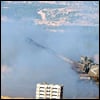I hate this war. Not for the messy politics it engenders for our nation, but for the moral clarity it brings me.
I lie on my bed, my arms folded under my head; the bombs falling on Baghdad are the tears falling on my pillow. The radio commentator explains endlessly the explosions that are his accompaniment; my tears eventually stop. But they will come again. I have no political opinions, I am not even registered to vote, my tears are not protests against the president.
In the days leading up to the war, I followed closely the rhetoric as expressed by its supporters and dissenters. I felt they were talking of something I couldn't understand. I felt like I did as a third grader, learning of the colonies and their revolution, asking my teacher, "But why did they have to kill each other? Why did they have to go to war? If everyone knew what would happen, why couldn't they all just stay alive?" Earlier that year, a neighbor had been brutally murdered. The shock and outrage, all of it awful, none of it awesome, was felt by me personally, and by the adults who cried about it behind closed doors. What was war, I asked myself in third-grade history class, if not state-sanctioned murder?
So I listened to the rhetoric, hoping it would help me understand that which eluded me. You would think, I wondered, that humanity would have figured out another way to solve its problems. The spears have evolved into missiles and the battlefield to open skies, but what we're doing remains very much the same. The technology has advanced into the twenty-first century, but we ourselves have remained in the dark ages.
I think back to my childhood in a violent city, peaceful now in retrospect. The manhunts that would stem from the intentional murder of a single person. The country would rally behind the family, memorials would be held nationwide, new laws would be enacted to protect future victims. Because one woman had her life taken. And now, my government, my country — I myself! — am sending out people to deliberately kill.
I try to analyze my tears. I am not against the war, I never could be. If there is one thing in which I have no ambiguities it is in my support for Israel, and the experts have told me that this war is good for Israel. Thus I cannot be a peace demonstrator. And, Israeli sympathies aside, I can agree that Saddam Hussein is a bad guy and there are differences between us Americans and the regime Saddam runs in Iraq. Irreconcilable differences? How can such a thing exist? We are all mature adults, we've solved many of the problems faced by man for ages, can't we talk it out, come to a joint solution? And the radio announces the death of two American marines and tears push away deductive thoughts. It is like my best friend yelling at me, only much worse.
But later, I realize that my reasoning has brought me somewhere. I think I'm beginning to understand why I hate the war. I abhor confrontation and will avoid it always, invariably, at all costs. I will cover for friends and colleagues in the most compromising circumstance. I will implicate myself, and apologize, if it saves me from argument. If I am not properly prepared for school or work, I will stay home, call in sick, rather than face the wrath of my teacher. Arguments seem so pointless, and now, war, so helpless.
I think about the issues I've never faced, the crimes I've taken blame for, and all those opted-out days, the avoided confrontations. And I think about my fellow countrymen, American soldiers, dropping bombs over an enemy. And I cry for the arguments that never were and for the argument that now is.
The moral clarity the war brings to me is that evil, finally, must be confronted, and yes, shot down.
Much has advanced over the centuries, but the building blocks of the world remain the same. It remains still for us, for humanity, for me, to see evil for what it is and fight it.
I cringe at the word, and the tears will still come. But they will be not for what the world is, but for what it could be, when we have the courage to really fight.






Join the Discussion